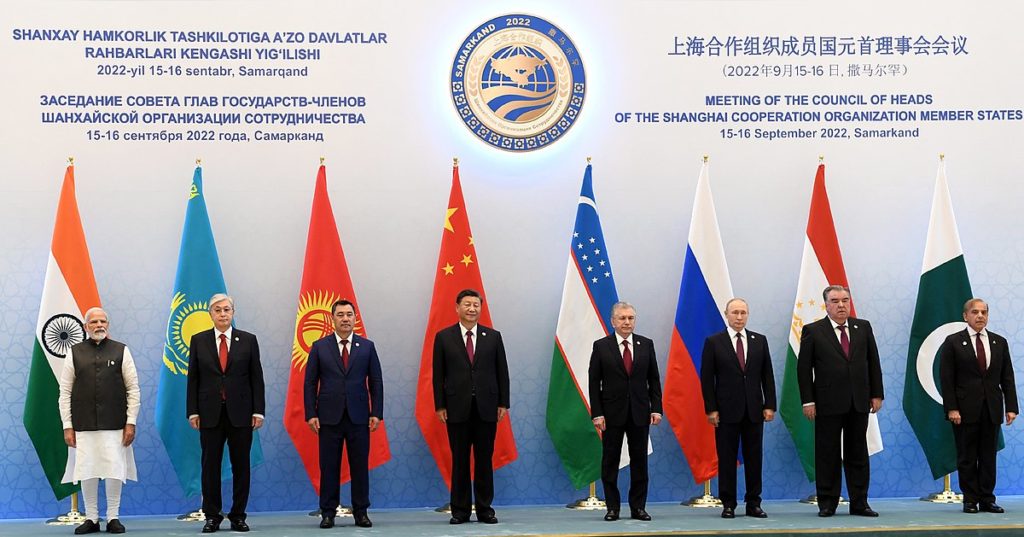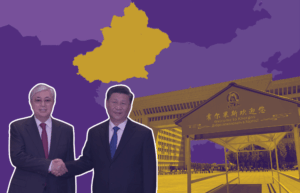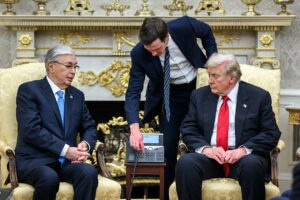DECODING: President Xi Jinping made an official visit to Kazakhstan and Uzbekistan during the last SCO summit, his first trip since the pandemic. It’s a strategic destination for Pekin, which would seem to benefit from regaining influence in Central Asia, as the Central Asian states reinforce their bilateral relationships with China. An official visit from the Chinese president comes at a pivotal moment for Russia, which has been losing regional influence since the beginning of the war in Ukraine. The traditional competition between Pekin and Moscow in Central Asia seems to have resulted in a decisive victory for China, unless the Kremlin reacts. Decoding the political upheaval in the Russian “near-abroad”. This article was originally published by Novastan’s French website on 26 September 2022. It’s Xi Jinping’s first trip abroad for more than two years. On 14 September, the Chinese president visited Kazakhstan, before attending the Shanghai Cooperation Organization (SCO) forum, taking place in Samarkand, Uzbekistan on 15 and 16 September. The heads of state of Kazakhstan, Kyrgyzstan, Tajikistan, Turkmenistan, India, Iran and Russia were all present. Although this visit for the SCO summit has been planned for a long time, it came at an opportune moment for China due to the scepticism of Central Asian states towards Russia. The war in Ukraine has forced the heads of state in Central Asian countries to distance themselves from Vladimir Putin.
Is an ever greater asymmetry developing between Russia and China in Central Asia? “It used to be said that Russia looked after security, and China after the economy,” explains Thierry Keller, a lecturer of political science at the Université Libre de Bruxelles (ULB). “However, nowadays, China is looking to be more present in security matters.”
Kazakhstan, a thorn in the Russo-Chinese relations
During his visit to Nur-Sultan, the Chinese president made it clear that a ‘red line’ of Russian politics exists in Central Asia. As reported by the Kazakh media Vlast, the president declared that, “regardless of the evolving international situation, we will continue to resolutely support Kazakhstan by protecting its independence, its sovereignty and its territorial integrity”. Given the context of the war in Ukraine, this message was addressed directly to Vladimir Putin, warning him that his expansionist inclinations should not extend to Central Asia. Read more on Novastan: Kazakhstan’s gradual divorce from Russia Some consider this indicative of a weakening in the Sino-Russian partnership. For Timur Dadabayev, Professor of International Relations and Director of the Special program for Eurasian Studies at the University of Tsukuba in Japan, this declaration should be understood as a ‘pragmatic’ act by China. He reminds that Pekin has supported Russian positions towards the West and has shared the same rhetoric as the Kremlin in its anti-Western discourse. He adds that, “to a large extent, any weakening of the Russian position in its face-off would also imply the potential defeat of Chinese positions in disputes with the US, the EU or elsewhere.” The partnership between Russia and China is thus still persevering, as long as Russia does not threaten the security, economic or commercial interests of Central Asia, explains Thierry Kellner. In this sense, the position adopted by China with regard to the defence of Kazakhstan’s sovereignty does not necessarily negate the Sino-Russian partnership.
Shift towards China
Central Asian states, fearing the inconsistency of Russian foreign policy, are turning instead towards Pekin. Following the SCO summit, the roadmap including China, Kyrgyzstan and Uzbekistan has been relaunched by the signing of an agreement, which could serve to indirectly bypass Russian transport infrastructure, explains the American Media Eurasianet. In addition to abstaining from Russia, states are revealing themselves to be conciliatory towards China. Before the arrival of the Chinese president in Kazakhstan, Kazakh activists protested in Almaty on 5 September, demanding to be reunited with their loved ones in Xinjiang. Two of the activists have been arrested by the Kazakh police. The president Kassym-Jomart Tokaeyev is attempting to turn a blind eye to the Kazakhs in Xinjiang so as to not offend China and lose the guarantee of security, explains Temur Umarov in an interview for Radio Azattyq, the Kazakh branch of the American media Radio Free Europe.
The Growing Isolation of Russia
At this time, Russia is finding itself to be more and more isolated. During the last summit in Samarkand, “the welcome of Xi Jinping and that of Putin were radically different. The Chinese president was given a warm welcome, folklore performances… things that were not replicated at the arrival of the Russian President,” says Thierry Kellner. This element is significant for understanding the diminished position of Russia in Central Asia, because the SCO forum is above all a space of declaratory diplomacy where symbolism counts a lot, − explains the Belgian specialist. Other messages of this kind have also been noted, such as the images of Vladimir Putin waiting for the Kyrgyz President Sadyr Japarov, whereas it is usually the opposite case. The visit of Xi Jinping to Central Asia therefore reveals the unprecedented isolation in which Russia finds itself with its closest neighbours, the countries of the CIS. It explains why Russia is seeking to find a ‘new frontier’ in Central Asia, persisting in developing its influence in education, the media and business, concludes Timur Dadabayev.
Written by Emma Collet
Translated from French by Chloe Henshaw
Edited by Maya Ivanova and Anna Wilhelmi
For more news and analysis from Central Asia, follow us on Twitter, Facebook, Telegram, Linkedin or Instagram.
 In Central Asia, China is taking advantage of Russia’s isolation at war
In Central Asia, China is taking advantage of Russia’s isolation at war 



